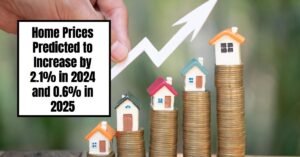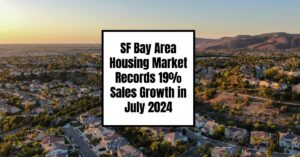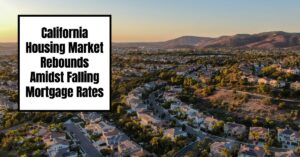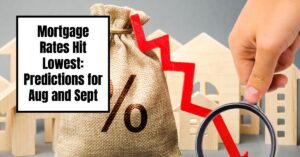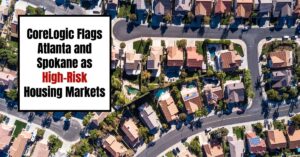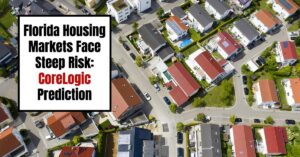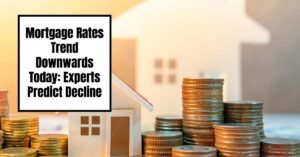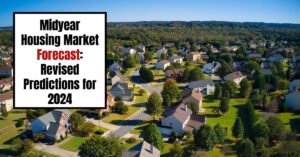The housing market predictions are heavily influenced by the persistent high mortgage rates and fluctuating home prices. Now the latest forecasts expect a modest increase of 2.1% in 2024, followed by 0.6% in 2025. With insights from reliable sources such as Freddie Mac and the National Association of Home Builders, we delve into the latest trends and forecasts impacting the housing market.
Home Prices Predicted to Increase by 2.1% in 2024 and 0.6% in 2025
Key Takeaways
- High Mortgage Rates Persist: Mortgage rates remain elevated, which dampens buyer demand.
- Home Sales Decline: Total home sales hit a low of 4.5 million in June, the lowest since July 2011.
- Builder Sentiment Low: The National Association of Home Builders (NAHB) reported a builder confidence index of 42, indicating concerns over the market's future.
- Inventory Issues: Although existing home inventories have increased, they are still below pre-pandemic averages.
- Home Price Predictions: Home prices are expected to rise 2.1% in 2024, but with significant regional variations.
Current Market Trends
The housing market in the U.S. remains in a challenging phase marked by high mortgage rates and diminishing buyer activity. According to Freddie Mac, the average mortgage rate for 30-year fixed loans stood at 6.85% in July 2024, which is slightly lower than the 6.92% average recorded in June. Despite this decrease, the mortgage activity has not seen a significant uptick. As potential buyers remain hesitant, there has been a 2.6% decline in overall mortgage applications compared to the previous month (Freddie Mac).
Existing home sales were reported at 3.89 million in June, marking a 5.4% decrease from the previous month and a 5.4% decline year-over-year. New home sales also fell, reaching 617,000, which represents a 0.6% dip month-over-month (Freddie Mac). While total home inventories improved by 23% year-over-year to 1.32 million units, they are still significantly below the pre-pandemic average of 1.8 million units.
Builder Sentiment and Housing Construction
The builder confidence index, as reported by the National Association of Home Builders (NAHB), dropped to 42 in July, reflecting the persistent challenges faced by builders in today's market. A reading below 50 indicates negative sentiment among builders, highlighting a contraction in building activity over the next six months. The declining confidence is largely attributed to high mortgage rates and reduced buyer interest (NAHB).
Despite the low confidence, new residential construction saw a 3% increase month-over-month in June, reaching 1.35 million units, although single-family home starts dipped by 2%. In contrast, multifamily starts increased by 10%, indicating a potential shift in housing demand towards rental properties.
Price Dynamics in the Housing Market
According to Freddie Mac's House Price Index, house prices rose by 0.2% in June 2024, leading to an overall annual increase of 5.2%. However, it's important to note that the rapid price growth observed since 2019 has not translated into an equitable increase in affordability. The current economic conditions suggest that while nominal prices are on the rise, inflation-adjusted growth has not been as pronounced. This discrepancy highlights a crucial factor that is holding back many prospective homeowners.
Outlook for Home Sales and Prices
Looking ahead, the housing market is expected to see a gradual recovery in home sales. The anticipated cooling of mortgage rates could entice more first-time homebuyers back into the market. While the tight inventory is still a concern, it is expected that as conditions normalize, home sales could moderately increase toward the end of 2024 and into 2025, albeit remaining below 6 million annually.
Forecasts suggest home prices will continue to appreciate at a modest rate of 2.1% in 2024, followed by a smaller 0.6% increase in 2025. This prediction comes as a result of strengthening demand relative to ongoing inventory constraints and high mortgage costs.
Conclusion
In summary, the U.S. housing market in August 2024 is marked by high mortgage rates, decreasing home sales, and fluctuating builder confidence. While the outlook shows potential for recovery, affordability challenges remain a significant barrier for many buyers. As mortgage rates slowly decrease and inventory stabilizes, we may see a returning confidence among buyers and sellers alike in the coming months.
At the same time, it is essential for prospective homeowners and investors to stay informed about market trends, analyze their financial situations, and understand their local markets' dynamics as they plan their next steps.
FAQs
1. What are the main factors affecting the housing market in August 2024?
High mortgage rates, decreasing home sales, and builder confidence are significant factors.
2. How much are home prices expected to increase in 2024?
Home prices are projected to rise by approximately 2.1% in 2024.
3. What is the current state of inventory in the housing market?
Inventory has improved year-over-year, but it still falls short of pre-pandemic levels.
4. What is the builder sentiment index, and what does it indicate?
The builder sentiment index is currently at 42, indicating negative perceptions regarding future market conditions.
5. What should homebuyers consider when looking to purchase a home now?
Potential buyers should assess their financial readiness, stay updated on mortgage rate trends, and understand local market conditions.
ALSO READ:
- Trump vs Harris: Which Candidate Holds the Key to the Housing Market (Prediction)
- 2008 Forecaster Warns: Housing Market 2024 Needs This to Survive
- Housing Market Predictions for the Next 2 Years
- Housing Market Predictions for Next 5 Years (2024-2028)
- Housing Market Predictions 2024: Will Real Estate Crash?
- Housing Market Predictions: 8 of Next 10 Years Poised for Gains
- Don't Panic Sell: Here's What Current Housing Market Trends Predict
- 2024 Housing Market vs. 2008 Crash: Key Differences
- Economist Predicts Stock Market Crash Worse Than 2008 Crisis
- How Much Did Housing Prices Drop in 2008?
